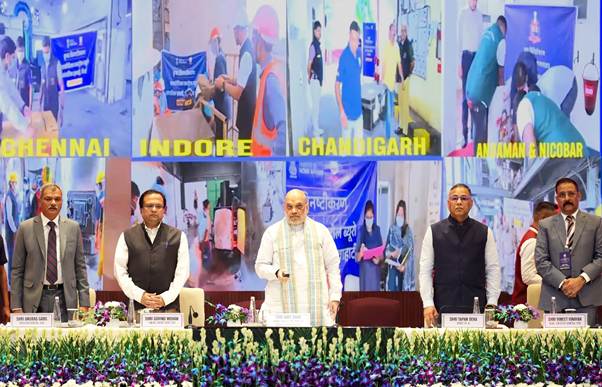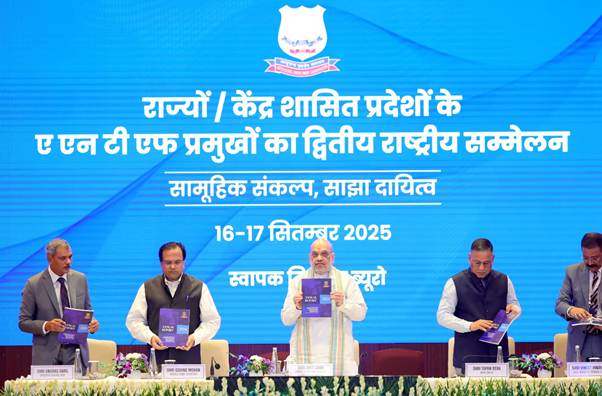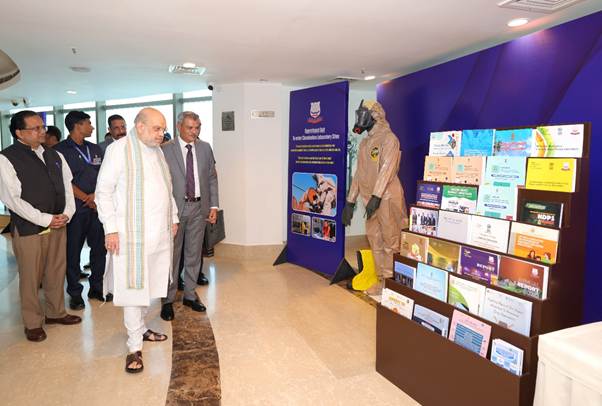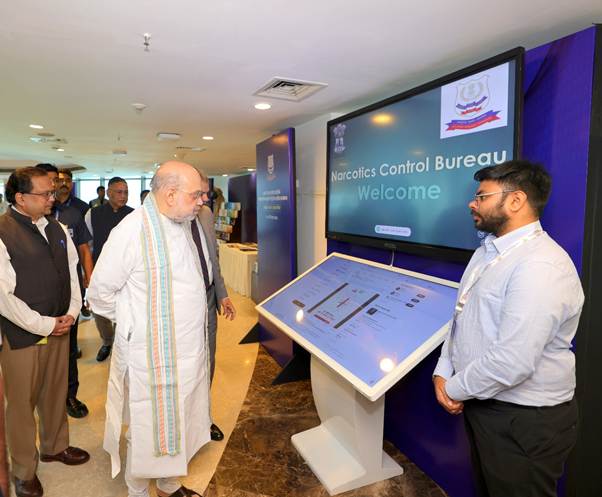Ministry of Home Affairs
Union Home Minister and Minister of Cooperation, Shri Amit Shah, addresses the inaugural session of the second National Conference of the Heads of Anti-Narcotics Task Force (ANTF) of states and Union Territories in New Delhi
Union Home Minister launches NCB’s drug disposal campaign and destroyed 1.37 lakh kilograms of drugs worth ₹4,800 crore at 11 locations
The Modi government is taking ruthless action not only against small drug dealers but also against big drug cartels
The government is adopting a ruthless approach towards drugs supply chain, a strategic approach towards demand reduction, and a humane approach towards harm reduction
We need to scale up the scope of action and execution
Severe blows are being dealt to the kingpins—from the entry points, distribution networks and to the local sale of drugs in the country
Those from abroad, who trade drugs will be punished by the law through extradition and deportation arrangements
All state ANTF chiefs should identify synthetic drugs in their jurisdictions and carry out destruction operations
Posted On:
16 SEP 2025 6:39PM by PIB Delhi
Union Home Minister and Minister of Cooperation, Shri Amit Shah, today addressed the inaugural session of the second National Conference of the Heads of Anti-Narcotics Task Force (ANTF) of states and Union Territories in New Delhi. On this occasion, Shri Amit Shah released the Narcotics Control Bureau (NCB) Annual Report-2024 and launched the Online Drug Disposal Campaign. The conference, held on September 16 and 17, is attended by ANTF heads from 36 states and Union Territories, along with stakeholders from other government departments. The event was also attended by dignitaries including the Union Home Secretary, the Director of the Intelligence Bureau, and the Director General of NCB.

Speaking on the occasion, Shri Amit Shah said that Prime Minister Shri Narendra Modi’s resolve for a drug-free India and the fight against drugs can only succeed if the NCB, the Ministry of Home Affairs (MHA), all departments of the Government of India, state governments, and ANTF teams make it their own resolve. He emphasized that Prime Minister Modi has envisioned a great and developed India by 2047, and protecting the youth from drugs is crucial for realizing this vision. Shri Shah said that the youth are the foundation of any nation, and if future generations are hollowed out, the country will lose its way.
Union Home Minister Amit Shah said that the Modi government is taking ruthless action against both small drug dealers and big drug cartels. He emphasized that the time has come to scale up action and execution in the fight against drugs. Shri Shah added that stringent measures are being implemented to target the entry, distribution, local sale, and masterminds of the drug trade in the country. He said that the battle is no longer just about catching small-scale drug peddlers but targeting three types of cartels: those operating at entry points, those distributing from entry points to states, and those selling narcotics in smaller areas within states. He urged every state to develop a high-level strategy targeting all three types of cartels, involving state and district police. He highlighted the need to adopt technologies such as darknet analysis, cryptocurrency tracking, communication pattern analysis, logistics, financial flow analysis, metadata analysis, and machine learning models to curb these cartels. Shri Shah emphasized that this is only possible if everyone involved in the campaign takes ownership of the fight. He urged all stakeholders to dedicate 12 days in a year to this battle, stating that without such resolve, scaling up the effort cannot be imagined.

Union Home Minister Shri Amit Shah said that the Drug-Free India campaign is currently active in 372 districts across the country, with 10 crore people and 3 lakh educational institutions involved. He emphasized that this is not enough, and the campaign should reach every district and educational institution. Shri Shah said that in recent years, NCB units have prepared a drug network chart that states can utilize. Additionally, a Mission Drug-Free Campus campaign is underway in universities and institutions across the country, alongside efforts to enhance training on darknet and cryptocurrency and increase the use of the Manas (Madak Padarth Nishedh Aasuchna Kendra) helpline. He mentioned that the National Investigation Agency (NIA) has registered 18 cases under the Prevention of Illicit Traffic in Narcotic Drugs and Psychotropic Substances (PITNDPS) Act and initiated 360-degree investigations. Similarly, the NCB has started 360-degree investigations in over 35 cases received from states. He added that thousands of people have been trained through training programs.
Shri Amit Shah emphasized that ANTF and National Narcotics Coordination Portal (NCORD) play a decisive role in the Drug-Free India campaign, and its success depends on the sensitization of every district, its police, and education officers. He stressed the need to involve religious leaders and youth organizations in the campaign. Shri Shah said that while the number of district-level NCORD meetings has increased, 272 districts in the country have not held a single NCORD meeting. He urged all ANTF heads to encourage district collectors to organize NCORD meetings and coordinate with chief secretaries to ensure this.
Union Home Minister and Minister of Cooperation highlighted the importance of deporting and extraditing fugitives. He said that the time has come to bring those operating drug trades from abroad under the ambit of Indian law. Shri Shah praised the Central Bureau of Investigation (CBI) for its commendable work in this direction and urged ANTF heads to coordinate with the CBI Director to establish a robust extradition system that is effective not only for drugs but also for terrorism and gang-related crimes. He stressed that just as extradition is crucial, a practical approach to deportation is equally important. A liberal approach to deportation processes should be adopted to ensure a mechanism for deporting criminals. Shri Shah emphasized the need for a joint mechanism involving NCB, CBI, and state police to bring back foreign criminals and fugitives involved in drug trafficking.

The Home Minister warned that the trend of synthetic drugs and labs is likely to increase in the coming days. He urged ANTF heads in every state to remain vigilant, identify, and destroy such labs or synthetic drugs. Shri Shah acknowledged significant progress in this area over the past year but stressed the need to prevent the creation of such labs and drugs altogether. He said that only when the availability of drugs is eliminated will drug users come forward for medical assistance.
Shri Amit Shah informed that approximately 1,37,917 kilograms of drugs worth about ₹4,800 crore were destroyed at 11 locations across the country. He advocated for establishing a scientific tradition of destroying seized drugs every three months in every state, as drugs in police custody pose a danger. Shri Shah emphasized that both a top-to-bottom and bottom-to-top approach are essential to address the drug problem. He clarified that the goal is not to create statistics but to build an India where such statistics are unnecessary. He said that this is only possible by adopting a top-to-bottom and bottom-to-top approach.
Shri Amit Shah said that a common structure and operational uniformity are very important. Only through the exchange of best practices and their open acceptance can state-specific Standard Operating Procedures (SOPs) be developed that suit local conditions — with the national SOP forming part of those. He warned that without putting such a mechanism in place, we will fall far behind in this fight. Shri Shah said that in at least every major narcotics case, we should try to use National Intelligence Grid (NATGRID) to identify the entire network; this will not only strengthen our case but also enable us to successfully dismantle the whole network. The Home Minister said the Modi government is leaving no stone unturned in assisting the states in the fight against drugs. He urged all ANTF chiefs to prepare an anti-narcotics action checklist that includes details on how the investigation was conducted and what efforts the district police made to identify the case. He added that reviewing this checklist every three months will ensure that the fight reaches down to the grassroots.

Union Home Minister and Minister of Cooperation said, that every state should form a special squad for following the financial trail, tracking hawala links, monitoring crypto transactions, and conducting cyber checks — only then can we fight this battle decisively. He said that every state should also have a unit of a narcotics-focused forensic lab, so that offenders cannot easily obtain bail. Shri Shah said there should be no hesitation in invoking PITNDPS in all eligible cases, and that prosecution arrangements in each state must be strengthened by studying the cases listed on the NCB online portal.
Shri Amit Shah said that the reporting of state-level NCORD meetings needs to be corrected on the portal. He said we should make greater use of the MANAS helpline number 1933. Shri Shah added that to break the drug supply chain we must take a ruthless approach, adopt a strategic approach for demand reduction, and follow a humane approach in harm reduction — taking steps under a three-pronged strategy.
Union Home Minister and Minister of Cooperation said that from 2004 to 2013, the quantity of drugs seized was 2.6 million kilograms, valued at ₹40,000 crore. From 2014 to 2025, this increased to 1 crore kilograms, valued at ₹1.65 lakh crore. He said that when coordinated efforts are made, success follows. We must accelerate our initiatives with a strategic approach; only then can we move much closer to realizing the vision of a drug-free India.
Shri Amit Shah said that between 2004 and 2014, drugs worth ₹3.63 lakh crore were disposed of, whereas between 2014 and 2025, drugs worth ₹35.21 lakh crore were disposed of. The value of drugs actually destroyed between 2004 and 2014 was ₹8,150 crore, while during 2014 to 2025, it rose to ₹71,600 crore. He further stated that in 2020, 10,700 acres of land used for drug cultivation was destroyed; in 2021, 11,000 acres; in 2022, 13,000 acres; and in 2023, 31,761 acres. Similarly, the destruction of land used for cannabis cultivation increased from 21,000 acres to 34,000 acres. Shri Shah said that during 2004 to 2014, 1.73 lakh people were arrested, while between 2014 and 2025, 7.61 lakh people were arrested. He added that, compared to the scale of the problem, this achievement is still small, and efforts must be multiplied many times over in order to succeed.
****
RK/VV/PS/PR
(Release ID: 2167289)
Visitor Counter : 646